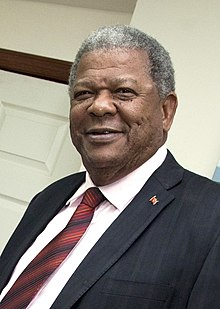Baldwin Spencer
| Baldwin Spencer | |
|---|---|
 |
|
| Prime Minister of Antigua and Barbuda | |
|
In office 24 March 2004 – 13 June 2014 |
|
| Monarch | Elizabeth II |
| Governor General |
James Carlisle Louise Lake-Tack |
| Preceded by | Lester Bird |
| Succeeded by | Gaston Browne |
| Minister of Foreign Affairs | |
|
In office 6 January 2005 – 13 June 2014 |
|
| Preceded by | Harold Lovell |
| Succeeded by | Charles Fernandez |
| Personal details | |
| Born |
Winston Baldwin Spencer 8 October 1948 |
| Political party | United Progressive Party |
| Spouse(s) | Jacklyn Spencer |
| Children | 2 |
| Religion | Seventh-day Adventist |
Winston Baldwin Spencer (born October 8, 1948) was the Prime Minister of Antigua and Barbuda from 2004 to 2014.
Spencer led the opposition United Progressive Party (UPP) to victory in the March 2004 parliamentary election. In addition to serving as Prime Minister, he became Minister of Foreign Affairs on January 6, 2005.
Spencer's party was swept from power in the June 2014 general election.
Baldwin Spencer is rooted in labour. For a quarter-century, he was a prominent labour leader with the Antigua and Barbuda Workers Union. He was first elected to Parliament in 1989 as the MP for the St. John's Rural West constituency.
In 1992, Spencer played an integral role in the formation of the United Progressive Party. He previously served as a leader with the United National Democratic Party and spearheaded collaborative meetings with the Antigua Caribbean Liberation Movement that resulted in the formation of the United Progressive Party. Upon formation of the party, Spencer rose to become the political leader of the party and the Opposition Leader in the Parliament.
As Opposition Leader Baldwin Spencer organized public demonstrations and went on a hunger strike to advocate for electoral reform after the widely criticized 1999 elections. His advocacy led to the formation of an independent Electoral Commission to oversee elections in Antigua and Barbuda. He also led the fight to ensure that opposition had access to state-owned media, such as the television station, Antigua Broadcasting Service (ABS). To that end, he filed a writ and took the Bird Government to court arguing that, in a democratic society, citizens have a right to hear an opposing political perspective on government airwaves.
In 2004, Baldwin Spencer led the United Progressive Party to a landslide victory in the general election. He defeated Lester Bird's ALP, which had ruled Antigua and Barbuda for the previous 28 years. In Government he moved to enact a trio of good government reforms: a nationwide school meals programme, raising the minimum wage and paying all civil servants.
...
Wikipedia
